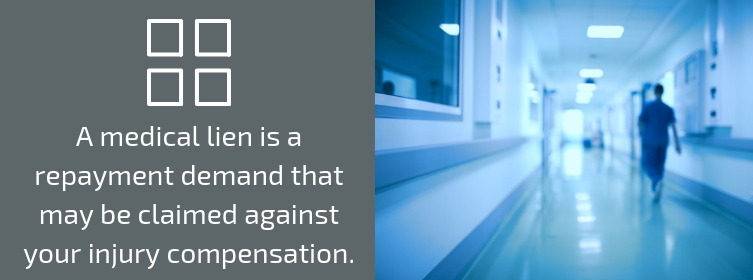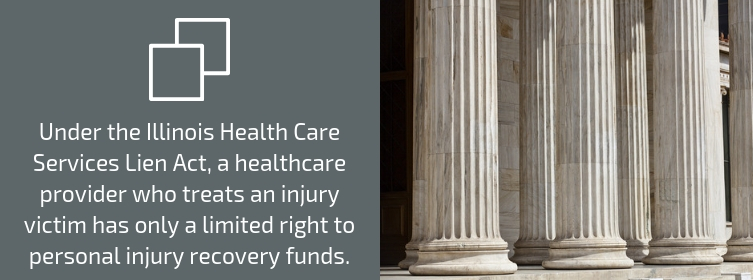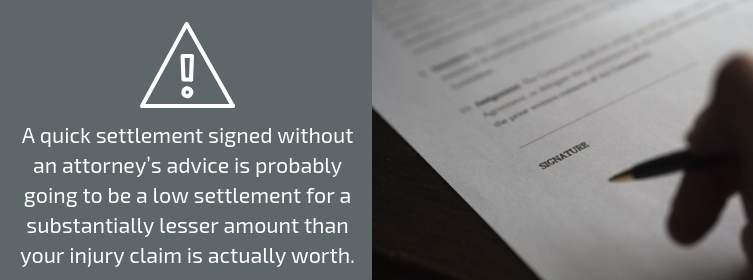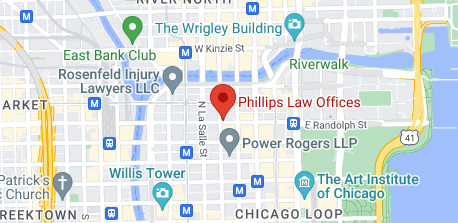If you are injured in the state of Illinois because another person was negligent – a careless driver, property owner, or dog owner, for example – it is imperative to put your case immediately in the hands of an experienced Chicago car accident attorney.
The injured victims of negligence are entitled under state law to complete compensation for all of their accident-related medical bills, lost wages, personal pain and suffering, and more. But you will have to prove that you were injured by negligence, and you will need an attorney’s help.
However, once you’ve received an out-of-court settlement or a jury verdict for a personal injury, you may have trouble hanging onto it.
WHO CAN PLACE A LIEN AGAINST PERSONAL INJURY COMPENSATION?
You might be surprised to learn that in this state, auto insurance companies, health insurance companies, and healthcare providers may be able to make a legal claim against your personal injury compensation – after you’ve received it.
In fact, here in Illinois, a medical lien is common in personal injury situations. A medical lien is a repayment demand that may be claimed against your injury compensation.

If you were injured, and if another party paid all or part of your medical expenses – or agreed to withhold billing until you received your recovery – you may have to reimburse the party who paid for your medical treatment or pay any healthcare provider who agreed to delay billing.
WHAT IS SUBROGATION?
When a health insurance company or a healthcare provider seeks to be reimbursed for your medical costs from your personal injury recovery, it is a process known in the law as “subrogation.”
The strength of an insurance company’s subrogation claim hinges on state law and on the precise wording of the insurance policy in question. Unlike some states, Illinois allows subrogation clauses to be included in insurance policies, and the state enforces legitimate subrogation claims.
CAN HEALTHCARE PROVIDERS ALSO CLAIM PART OF YOUR RECOVERY?
Like insurance companies in Illinois, hospitals and other healthcare providers in this state are also entitled to be paid from a personal injury recovery if medical bills are due or if billing was withheld until compensation was received.
A healthcare provider may even ask a patient to sign a lien agreement, although medical provider liens are strictly regulated in this state.
Under the Illinois Health Care Services Lien Act, a healthcare provider who treats an injury victim has only a limited right to personal injury recovery funds.
The law makes certain that healthcare providers are compensated – without taking everything that an injury victim receives at the conclusion of the arduous personal injury process.
WHAT DOES THE LAW SAY?
Specifically, what does the Illinois Health Care Services Lien Act provide?
When a personal injury victim in this state receives an out-of-court settlement or a jury verdict, a medical lien against that compensation may not exceed forty percent of the total amount. Even with multiple lienholders, medical liens may not exceed forty percent of the recovery amount.
Although the Illinois Health Care Services Lien Act spells out – in detail – what percentages of a recovery amount each healthcare provider and professional may be entitled to, the law does not require a healthcare provider to excuse or “write off” any remaining debt amount.
An Illinois healthcare provider is then free to use another method to collect any additional amount due – a wage or bank account garnishment, for example – but not a medical lien.
WHAT IS REQUIRED FOR A MEDICAL LIEN TO BE VALID?
For a medical lien to be legal and enforceable in Illinois:
1. It must include the injury victim’s name, address, date of the injury, the healthcare provider’s name and address, and the name of the defendant in the injury victim’s personal injury claim.
2. The lien has to be “served” on both the injured victim and the personal injury defendant. The law requires sending it by certified or registered mail or delivering it personally.
If a healthcare provider demands reimbursement from your personal injury recovery amount, it may be a legitimate demand, but it is still important to know precisely what – in the insurance policy or in the law – gives the healthcare provider the right to make the demand.
HOW CAN YOUR ACCIDENT ATTORNEY HELP?
Lien law is extremely complicated in Illinois, so you will need your personal injury lawyer’s guidance and advice – and sometimes, you’ll need that lawyer’s negotiating skills as well.
It may be possible to persuade a lienholder to settle for less than the lien amount.
Your attorney may be able to negotiate a reduced amount with a medical lienholder, but it won’t be like negotiating a personal injury settlement with an insurance company. Medical providers have the right to be paid in full for their services.
WHAT ARE THE APPLICABLE STATUTES OF LIMITATIONS?
In Illinois, the statute of limitations for a subrogation action is two years. An insurance company or a healthcare provider must file its subrogation claim within two years of the injury date. This is the same amount of time that an injury victim has to file a personal injury lawsuit in this state.
If you are injured because of another person’s negligence in any kind of accident in Illinois, don’t wait two years to speak with an attorney. Do it right away.
And do not sign or agree to a settlement with the negligent party’s auto or health insurance company until or unless you have consulted a Chicago medical malpractice attorney.
WHY IS AN INJURY ATTORNEY’S GUIDANCE SO IMPERATIVE?
A quick settlement signed without an attorney’s advice is probably going to be a low settlement for a substantially lesser amount than your injury claim is actually worth.
A quick settlement also means waiving your right to take further legal action or to seek additional compensation. It may additionally include a “waiver of subrogation” provision that will legally prevent your own insurance company from exercising its subrogation rights.
If you are injured because of someone else’s negligence in the state of Illinois, you must be advised and represented by an experienced Illinois personal injury lawyer.
Proving your that you were injured by another person’s negligence is just one part of a personal injury case. Holding onto your settlement or jury verdict, however, can sometimes be even more complicated and confusing.
You’ll need a good accident lawyer’s advice and services. That is your right.
Also Read:
Wrongful Death Expert Witnesses
What is workers’ compensation insurance coverage?









